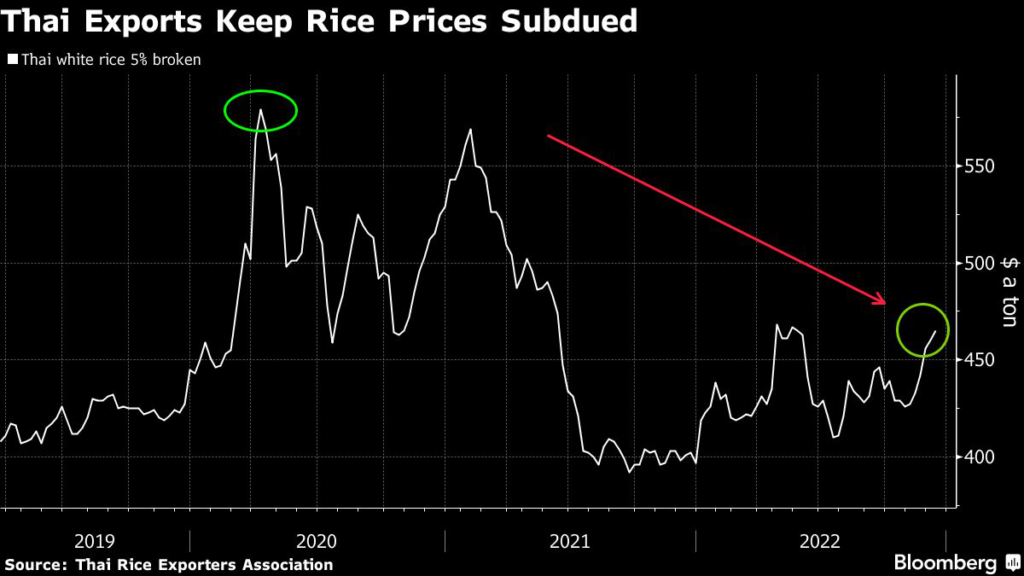Thailand, the world’s biggest rice exporter after India, is on track to ship the highest volume in four years as importing countries boost purchases to replenish stockpiles and keep a lid on food inflation.
(Bloomberg) — Thailand, the world’s biggest rice exporter after India, is on track to ship the highest volume in four years as importing countries boost purchases to replenish stockpiles and keep a lid on food inflation.
Exports will probably climb to 8 million tons this year as a weak currency boosts competitiveness and countries such as China look to rebuild inventories before the Lunar New Year holidays, said Chookiat Ophaswongse, honorary president of Thai Rice Exporters Association. Shipments could hold at a similar level through next year, he said.
Prices of essential foods such as wheat and cooking oils hit a record this year after Russia’s invasion of Ukraine throttled Black Sea supplies. That sparked a wave of food protectionism as governments curbed exports to cool prices. One country to do this was top rice shipper India, opening the door for Thailand.
Rice is a staple for half the world, and while wheat soared to its highest ever in March, rice was relatively subdued, helping to constrain food inflation in Asia. People in some countries, such as Indonesia, may have shifted away from expensive wheat to cheaper rice in a bid to keep food costs under control.
Benchmark rice in Asia hit a high this year of $468 a ton in May and a low of $410 in July. Those prices compare with more than $1,000 a ton during a food crisis in 2008, according to data from the Thai Rice Exporters Association.
Thailand benefited this year from India’s move to limit shipments, and also from Iraq’s return to the market, Chookiat said in an interview. Thailand’s strong rice exports reflected global food security fears, and lower production in top growers like India, which accounts for almost 40% of international trade.
“Countries have been importing more rice to build stockpiles and keep domestic prices down,” Chookiat said. “The weak baht and our lower prices this year boosted our competitiveness,” he said, referring to the Thai currency.
READ: Global Food Supply Faces Fresh Turmoil With Rice Set to Climb
Indonesian Purchases
Estimated exports this year of 8 million tons are higher than the target of 7.5 million tons, which would already be a jump of about 20% from 2021. The largest single buyer this year is Iraq, which has accounted for 1.5 million tons, according to Chookiat. The Middle Eastern country stopped importing Thai rice after 2013 due to quality concerns, and only resumed last year.
Indonesia is one of the countries buying foreign rice to increase stockpiles and cap inflation. State-owned Bulog is importing the grain for the first time since 2018, with 200,000 tons coming from Thailand, Vietnam, Pakistan and Myanmar. The US Department of Agriculture sees Indonesian demand helping to lift Thai exports to 8.5 million tons in 2023, and has increased its estimate for this year to 7.9 million tons on strong demand from Iraq.
The Iraqi buying should also continue well into next year and shipments to Indonesia are likely to increase, Chookiat said. Thailand should have plenty of supply because of favorable weather during this year’s main harvest and robust off-season production next year, he said.
(Adds fifth paragraph on Asian prices this year)
More stories like this are available on bloomberg.com
©2022 Bloomberg L.P.










